选择大企业还是小企业-作文
毕业后选择大公司还是小公司作文
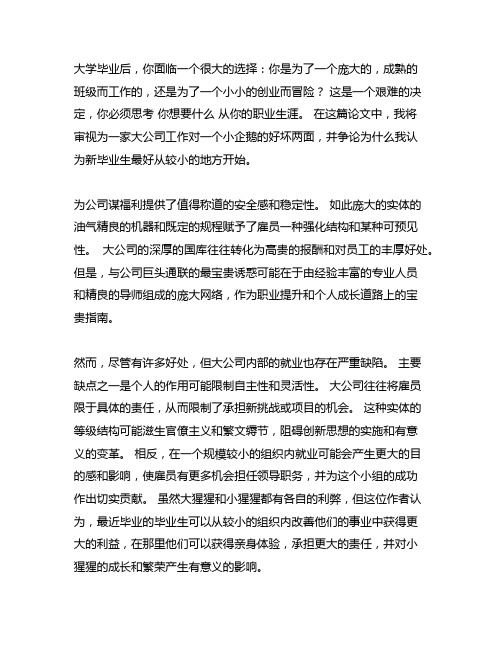
大学毕业后,你面临一个很大的选择:你是为了一个庞大的,成熟的
班级而工作的,还是为了一个小小的创业而冒险?这是一个艰难的决定,你必须思考你想要什么从你的职业生涯。
在这篇论文中,我将
审视为一家大公司工作对一个小企鹅的好坏两面,并争论为什么我认
为新毕业生最好从较小的地方开始。
为公司谋福利提供了值得称道的安全感和稳定性。
如此庞大的实体的
油气精良的机器和既定的规程赋予了雇员一种强化结构和某种可预见性。
大公司的深厚的国库往往转化为高贵的报酬和对员工的丰厚好处。
但是,与公司巨头通联的最宝贵诱惑可能在于由经验丰富的专业人员
和精良的导师组成的庞大网络,作为职业提升和个人成长道路上的宝
贵指南。
然而,尽管有许多好处,但大公司内部的就业也存在严重缺陷。
主要
缺点之一是个人的作用可能限制自主性和灵活性。
大公司往往将雇员
限于具体的责任,从而限制了承担新挑战或项目的机会。
这种实体的
等级结构可能滋生官僚主义和繁文缛节,阻碍创新思想的实施和有意
义的变革。
相反,在一个规模较小的组织内就业可能会产生更大的目
的感和影响,使雇员有更多机会担任领导职务,并为这个小组的成功
作出切实贡献。
虽然大猩猩和小猩猩都有各自的利弊,但这位作者认为,最近毕业的毕业生可以从较小的组织内改善他们的事业中获得更
大的利益,在那里他们可以获得亲身体验,承担更大的责任,并对小
猩猩的成长和繁荣产生有意义的影响。
工作选择大公司还是小公司英语作文
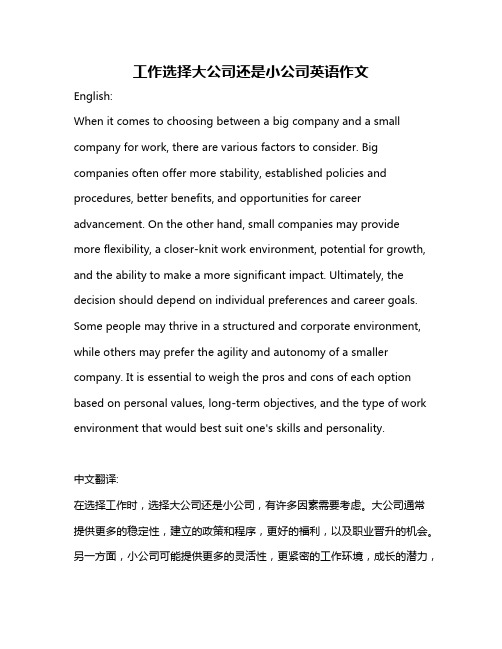
工作选择大公司还是小公司英语作文English:When it comes to choosing between a big company and a small company for work, there are various factors to consider. Big companies often offer more stability, established policies and procedures, better benefits, and opportunities for career advancement. On the other hand, small companies may provide more flexibility, a closer-knit work environment, potential for growth, and the ability to make a more significant impact. Ultimately, the decision should depend on individual preferences and career goals. Some people may thrive in a structured and corporate environment, while others may prefer the agility and autonomy of a smaller company. It is essential to weigh the pros and cons of each option based on personal values, long-term objectives, and the type of work environment that would best suit one's skills and personality.中文翻译:在选择工作时,选择大公司还是小公司,有许多因素需要考虑。
你认为大公司好还是小公司好的英语作文
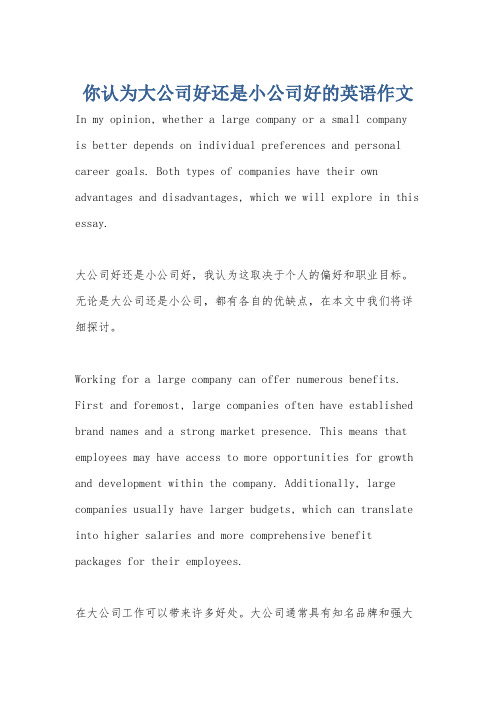
你认为大公司好还是小公司好的英语作文In my opinion, whether a large company or a small company is better depends on individual preferences and personal career goals. Both types of companies have their own advantages and disadvantages, which we will explore in this essay.大公司好还是小公司好,我认为这取决于个人的偏好和职业目标。
无论是大公司还是小公司,都有各自的优缺点,在本文中我们将详细探讨。
Working for a large company can offer numerous benefits. First and foremost, large companies often have established brand names and a strong market presence. This means that employees may have access to more opportunities for growth and development within the company. Additionally, large companies usually have larger budgets, which can translate into higher salaries and more comprehensive benefit packages for their employees.在大公司工作可以带来许多好处。
大公司通常具有知名品牌和强大的市场影响力。
这意味着员工可能会在公司内部获得更多的成长和发展机会。
大公司往往拥有更高额的预算,这可能会转化为员工薪水更高、福利更全面。
你会选择大公司还是小公司小作文

你会选择大公司还是小公司小作文英文回答:I have always been torn between the idea of working fora large company or a small company. On one hand, large companies offer stability, established processes, and potentially more resources. On the other hand, small companies provide a more intimate work environment, the opportunity to make a big impact, and often a more dynamic and flexible work culture.In the context of a large company, there is a sense of security and stability that is appealing. With established processes and procedures in place, employees often have a clear understanding of what is expected of them and how to navigate the corporate structure. Additionally, large companies may have more resources at their disposal, such as advanced technology, extensive training programs, and comprehensive benefits packages. For example, when I was considering a position at a large tech company, I wasimpressed by their state-of-the-art facilities and the wide range of professional development opportunities they offered to their employees.Conversely, small companies offer a different set of advantages. The work environment tends to be more intimate, with closer relationships between colleagues and often more direct access to leadership. This can lead to a greater sense of camaraderie and a feeling of being truly valued as an individual contributor. Moreover, in a small company, there is often more opportunity to make a big impact and take on a variety of responsibilities. For instance, when I worked for a small start-up, I was able to take on multiple roles and contribute to the company's growth in a way that would have been more challenging in a larger, more structured organization.中文回答:我一直在选择是在大公司工作还是小公司之间犹豫不决。
毕业后去大公司工作还是小公司好英语作文
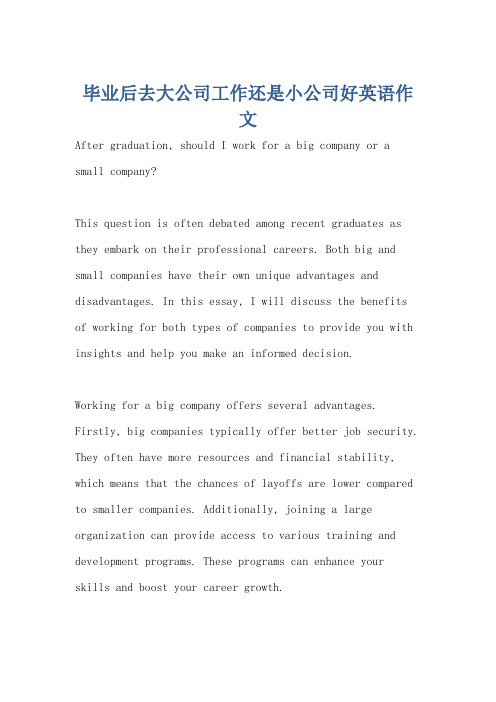
毕业后去大公司工作还是小公司好英语作文After graduation, should I work for a big company or a small company?This question is often debated among recent graduates as they embark on their professional careers. Both big and small companies have their own unique advantages and disadvantages. In this essay, I will discuss the benefits of working for both types of companies to provide you with insights and help you make an informed decision.Working for a big company offers several advantages. Firstly, big companies typically offer better job security. They often have more resources and financial stability, which means that the chances of layoffs are lower compared to smaller companies. Additionally, joining a large organization can provide access to various training and development programs. These programs can enhance yourskills and boost your career growth.However, there are also drawbacks to consider when working for big corporations. One downside is that employees may feel like just a small cog in a large machine due to the hierarchical structure of these organizations. This could potentially hinder creativity and innovation because decision-making processes may be slow and bureaucratic. Moreover, employees might face more intense competition within the company since there are often more employees vying for promotions.On the other hand, working for a small company has its own set of benefits. One advantage is that it offers greater opportunities for learning and taking on responsibilities early in your career. In smaller organizations, departments tend to be leaner, which means that employees often have greater exposure to different areas of the business. This allows individuals to develop a broader skill set and gain hands-on experience in various roles.Despite these advantages, there are also challenges associated with working for small companies. Firstly, job security may not be as strong as in bigger corporations.Smaller businesses face higher risks due to limited resources and potential market fluctuations. Additionally, there may be fewer opportunities for professional development compared to larger organizations since they typically have fewer formal training programs or fewer mentors available.Ultimately, the choice between working for a big company or a small company depends on your career goals and personal preferences. If you value job security and structuredcareer development opportunities, a big company might bethe better choice for you. On the other hand, if you prefer a more dynamic and hands-on work environment with greater learning potential, a small company may suit you better.In conclusion, deciding whether to work for a big companyor a small company after graduation requires careful consideration of the advantages and disadvantages of each. Both types of organizations offer unique opportunities for professional growth but also come with their own challenges. It is important to reflect on your career aspirations and weigh the pros and cons before making a decision.中文翻译:毕业后去大公司工作还是小公司好?这个问题常常在新近毕业的学生之间展开辩论,当他们开始职业生涯时。
小公司还是大公司?Do You Prefer to Work in Small Company or Big Company- (大学英语作文)

小公司还是大公司?Do You Prefer toWork in Small Company or BigCompany?大学英语作文When college students graduate, there is a big problem that they have to face by themselves. It is finding a job. It is well-known that the university students are hard to find a job, but there are still various companies. Therefore, what kind of companies should they pick are really a question. When it comes to this problem, some prefer to work in small companies, while some choose the big enterprise. As far as I am concerned, both small companies and big companies have their own advantages. As to how to choose, it should depend on personal situation.大学生毕业后,他们不得不自己面对一个大问题。
那就是找工作。
众所周知,大学生找工作难,不过还是有形形色色的公司要人。
因此,该选择什么样的公司真的是一个问题。
说到这个问题的时候,有些人喜欢在小公司工作,而有些人则选择大公司。
就我而言,无论是小公司还是大公司都有其优势。
至于如何选择,应视个人情况而定。
On the on hand, small company is easy to getpromotion. If you work in a small company, you can get improved faster. As you are capable to finish the job in your company, the boss in the small enterprise will pay special attention to you quickly. Of course, you can get promotion or become the main person in your company soon. However, you can’t make sure this in the big company, because there are so many talents in it and the boss has so many excellent staff.一方面,小公司很容易升职。
在大小企业工作的特点和偏好作文
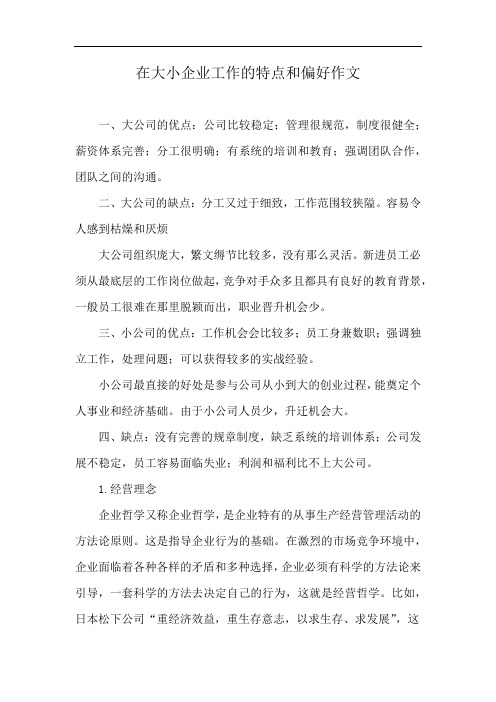
在大小企业工作的特点和偏好作文一、大公司的优点:公司比较稳定;管理很规范,制度很健全;薪资体系完善;分工很明确;有系统的培训和教育;强调团队合作,团队之间的沟通。
二、大公司的缺点:分工又过于细致,工作范围较狭隘。
容易令人感到枯燥和厌烦大公司组织庞大,繁文缛节比较多,没有那么灵活。
新进员工必须从最底层的工作岗位做起,竞争对手众多且都具有良好的教育背景,一般员工很难在那里脱颖而出,职业晋升机会少。
三、小公司的优点:工作机会会比较多;员工身兼数职;强调独立工作,处理问题;可以获得较多的实战经验。
小公司最直接的好处是参与公司从小到大的创业过程,能奠定个人事业和经济基础。
由于小公司人员少,升迁机会大。
四、缺点:没有完善的规章制度,缺乏系统的培训体系;公司发展不稳定,员工容易面临失业;利润和福利比不上大公司。
1.经营理念企业哲学又称企业哲学,是企业特有的从事生产经营管理活动的方法论原则。
这是指导企业行为的基础。
在激烈的市场竞争环境中,企业面临着各种各样的矛盾和多种选择,企业必须有科学的方法论来引导,一套科学的方法去决定自己的行为,这就是经营哲学。
比如,日本松下公司“重经济效益,重生存意志,以求生存、求发展”,这就是日本的战略决策哲学。
2.价值观观念我们所说的价值观念,是人们在追求某种功利或道义的基础上,对人(组织)自身的存在、行为和行为结果进行评价的基本观点。
也许,生命是为追求价值而存在的,价值观念决定着生命的追求行为。
价值观念并非人们对暂时事物的反映,而是长期实践活动中形成的价值观念体系。
价值观念,是企业员工对企业存在的意义、经营目的、经营宗旨的价值评价,以及为之追求的整体性、群体性意识,是企业全体员工共同的价值准则。
企业正确的价值目标是建立在公共价值准则基础上的。
拥有正确的价值目标才会有努力地追求价值目标,企业才有希望。
所以,价值观决定了员工的行为取向,关系到企业的生死。
只顾及企业自身经济效益的价值观念,就会偏离社会主义方向,不仅会损害国家和人民的利益,也会影响企业形象;只顾及眼前利益的价值,就会急功近利,搞短期行为,使企业失去后劲,走向灭亡。
大学生毕业后选择大公司还是小公司英语作文

大学生毕业后选择大公司还是小公司英语作文After completing their university studies, graduates are faced with the decision of which type of company to work for - a large corporation or a smaller startup. Both options have their own unique advantages and disadvantages that graduates must carefully weigh. Ultimately the choice will depend on the individual's career goals, personal preferences, and long-term aspirations.One of the primary advantages of joining a large company is the stability and security it can offer. Large corporations typically have well-established business models, significant financial resources, and structured career development programs. This can provide graduates with a sense of stability and the opportunity to build a long-term career within the organization. Large companies also often have extensive training and mentorship programs that can help young professionals develop important skills and knowledge. Additionally, the brand name and prestige associated with working for a major corporation can be beneficial for one's professional reputation andfuture career prospects.In contrast smaller startup companies can offer graduates a more dynamic and fast-paced work environment. Startups are often characterized by a greater sense of energy, innovation, and entrepreneurial spirit. Employees at startups tend to have a higher degree of autonomy, the ability to take on more diverse responsibilities, and opportunities to make a more direct impact on the business. The rapid growth and evolving nature of startups can also provide accelerated career advancement for talented individuals. Furthermore, startups often have a more casual and flexible work culture that appeals to many young professionals.Another key consideration is the type of work and industry that the graduate is interested in. Large corporations typically have a broad range of business functions and departments, allowing graduates to explore different roles and career paths. This can be beneficial for those who are still unsure about their specific interests or long-term goals. Startups on the other hand tend to be more specialized, focused on a particular product, service, or industry niche. This can be advantageous for graduates who have a clear sense of the type of work they want to pursue and are eager to develop deep expertise in a particular domain.The compensation and benefits package is another important factorto weigh. Large companies generally offer more comprehensive and stable compensation structures, including competitive salaries, bonuses, retirement plans, and robust healthcare and insurance benefits. This can provide graduates with a greater sense of financial security, especially in the early stages of their careers. Startups, on the other hand, may offer more equity-based compensation such as stock options or profit-sharing. While the upside potential may be higher, the financial rewards can also be more uncertain and variable.Geography and location are also worth considering. Large corporations often have offices and operations in multiple cities or countries, giving graduates more flexibility in terms of where they can be based. Startups, in contrast, are typically concentrated in specific hubs or regions, such as Silicon Valley, New York City, or other technology and innovation centers. The choice of location can impact factors such as cost of living, access to professional networks, and lifestyle preferences.Ultimately, the decision between a large company and a startup will come down to the individual's personal values, career aspirations, and lifestyle preferences. Graduates who prioritize stability, structured career development, and comprehensive benefits may be drawn to the security of a large corporation. Those who are more attracted to a dynamic, fast-paced environment, greater autonomy, and the potential for accelerated growth may find the startup optionmore appealing.Regardless of the choice, it is important for graduates to carefully research and evaluate the options, considering factors such as the company's financial health, growth trajectory, management team, company culture, and alignment with their own goals and values. Networking, informational interviews, and internships can also provide valuable insights to help inform this important career decision.In conclusion, the choice between a large company and a startup is a complex one that requires careful consideration of various factors. Graduates must weigh the trade-offs between stability and dynamism, structured career paths and entrepreneurial opportunities, and comprehensive benefits versus equity-based compensation. By understanding their own priorities and aspirations, graduates can make an informed decision that aligns with their long-term career goals and personal preferences.。
